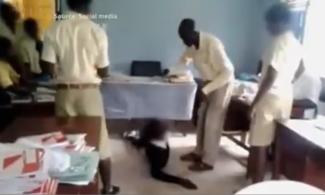
Several young people in Kenya have died or been maimed as a result of corporal punishments heaped on them in schools, BBC Africa Eye Investigation has revealed.
According to the report, cases of corporal punishment are still prevalent in schools in Kenya despite being outlawed in 2001.
In ‘Taught to Fear: Corporal Punishment in the Classroom,’ the BBC spoke to young victims and their families seeking justice, as well as the Kenyan teachers fighting back to end the brutal form of punishment in classrooms in the country.
Lead presenter and survivor of corporal punishment, Tom Odula said: "My school years were marked by brutal and degrading treatment at the hands of violent and sadistic teachers, which has stayed with me for life. It saddens me that decades on from the beatings I received at school, children are still experiencing the same trauma.”
Over the past five years, more than 20 deaths linked to corporal punishment have been reported in the media. A whistle-blower from the Kenyan teaching governing body, Teachers Service Commission (TSC), told the BBC that corporal punishment was "getting out of hand".
They said: "There are cases of children being injured and maimed. Some of these cases have resulted into very severe consequences, even death."
In 2019, Ebbie Samuels, a young Kenyan girl, died after she was allegedly beaten at school. The school said that she had died in her sleep, but witnesses claimed the school’s former deputy principal, Elizabeth Gatimu had beaten her because of her hairstyle, and an autopsy revealed that Ebbie had suffered from blunt force trauma to her head.
Ebbie's mother, Martha, told the BBC she believed the school tried to cover up her daughter's death. However, through a successful campaign led by Martha, Ms.Gatimu was charged with murder. She denies the charge.
The lawyer dealing with the case, Kiroko Ndgewa, told the BBC that it is rare for corporal punishment-related death cases to be prosecuted.
He said: “This is the first case I've seen. It is the case that shall set the precedent on how we deal with alleged instances of corporal punishment.”
Also, 15-year-old Caleb Mwangi shared his harrowing experience with the BBC. Caleb survived a brutal beating which he alleged was carried out by school director Nancy Gachewa and an older student, Idd Salim because he ate chapatis due to hunger.
Caleb spent 11 days in the ICU and required skin grafts due to severe back injuries. He told the BBC: "When I remember I become very angry. For me to get justice, I want this woman to be jailed."
Nancy Gachewa and Idd Salim were arrested and charged with assault causing grievous bodily harm. Salim was sentenced to four years imprisonment and in a plea bargain is testifying against Ms.Gachewa. She denies the charges and says she was not in the school at the time.
Another victim, Serfin Marutu, faced life-changing injuries after she was allegedly beaten by a teacher, Lucas Odhiambo Ochola, for not achieving the expected grades.
This resulted in Serfin developing severe back pains. Her family are struggling to afford proper treatment.
Serfin’s former headteacher, George Airo, responsible for student wellbeing and teacher conduct told the BBC that corporal punishment is not allowed in his school.
Yet, BBC investigators learned that Mr. Airo received complaints about Mr. Ochola’s poor behaviour at work, including drunkenness and the caning of students. When asked how many complaints the school received, Mr. Airo said “there were many.”
Instead of taking disciplinary action against the teacher, he was transferred to another school. Mr. Ochola denies beating Serfin and rejects the other claims about his behaviour.
Serfin’s brother, William, alleged that he tried to approach TSC for help on how they could help his sister, but this proved difficult. He claimed the TSC said they could not follow up with the case without Mr. Ochola’s TSC identification number, and that William needed to obtain a letter from the headteacher, Mr. Airo.
Yet, when William tried to obtain the TSC number and letter from Mr. Airo, he allegedly refused to give him Mr. Ochola’s TSC number. The headteacher denies being obstructive to William.
According to the TSC whistle-blower, William’s experience is not unique. The whistle-blower told the BBC by the time many cases reach the TSC “so much evidence has been corrupted”. They added: “Sometimes we cannot even get a hold of the witnesses. But I think it all begins at the grassroots level. There are cases which do not even reach us here, they never see the light of day.”
The BBC reached out to TSC to respond to all allegations made – they did not respond.
Robert Omwa is a member of Beacon Teachers, an organisation focused on violence prevention in the classroom and improving children’s rights.
He is fighting back to make schools safer for students. He used to cane his students; however, he now spreads a message of non-violence and shows other teachers alternative discipline methods.
Mr. Omwa told the BBC that he had a change of heart after realising the damage being caused to his students. “The moment I saw the light, was after using the cane I would go home feeling very unhappy, having inflicted the pain.”
He said he understands that caning is the only discipline method many teachers know, but he encourages his peers to stop using it.
Another teacher in the Beacon Teachers program shared her positive experience: "I stopped using the cane and now talk to my students, guiding and counselling them. The program has helped me and other teachers tremendously."
The BBC contacted the Ministry of Education to understand what they are doing to help victims of corporal punishment; they did not respond.